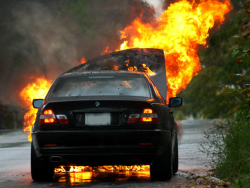
— BMW car fires in South Korea have convinced regulators with the Ministry of Land, Infrastructure and Transport to open another investigation into why vehicles are going up in flames.
Investigators want to determine why vehicles that were allegedly fixed during an exhaust gas recirculation (EGR) cooler recall caught fire.
In October 2018, BMW recalled about 1.6 million vehicles worldwide because of fire dangers related to the exhaust gas recirculation (EGR) coolers that leaked glycol.
BMW said the cooler modules were creating hot particles that could cause the intake manifolds to melt. The recall covered 2013-2018 models that could catch fire from soot deposits which caused the particles that melted the intake manifolds.
South Korean regulators were so worried about the risk of fires that certain BMW models were banned from the roads after reports of about 40 EGR cooler fires.
BMW owners claim they believed their vehicles were safe because the EGR modules were checked by dealerships and faulty engine intake manifolds were replaced during the 2018 recall.
Korean investigators, however, are curious why three of the recalled vehicles caught fire after recall repairs were performed. Those three fires occurred in a BMW 640d, BMW 525d and a BMW 320d.
South Korean officials determined the BMW 320d suffered from problems in the exhaust system, the 640d had a history of being under water and the 525d had a bad diesel particulate filter.
A BMW 328i and a BMW 5GT also caught fire and weren't included in the EGR recall, but investigators haven't determined why the vehicles burned.
Korean regulators say all the vehicles will be checked for leaks from the EGR modules to determine if the recall repairs were adequate and if the automaker should be penalized.
BMW was fined in December 2018 by South Korea after officials decided the automaker tried to conceal problems with the exhaust gas recirculation systems.
The nearly $10 million fine was issued following about 40 engine fires in South Korea in 2018. EGR coolant leaks and defective valves were blamed for the fires, and regulators found BMW allegedly knew about the problems since at least 2015.




